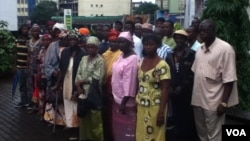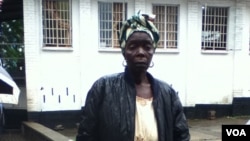FREETOWN, Sierra Leone — For years, parents in the West African nation of Sierra Leone have claimed their children were adopted without their consent during the country's civil war in the 1990s. A police investigation was concluded recently regarding their claims. And staff from the agency that handled the adoptions have been charged with 32 counts, including human trafficking.
"Whenever I go to bed I see their faces, whatever I'm doing, normally my mind will drop to them," said Abu Bakar Kargbo as he recalled his two siblings who were allegedly adopted illegally.
For 15 years he has been determined to find out where they are and let them know it was never the intent of their parents to give them up.
He is also the spokesperson for 29 other parents who claim they never gave up their children.
The parents say they left them at the Help A Needy Child International Center, or HANCI, during the war temporarily, so they would be safe and receive education.
HANCI then apparently contacted Maine Adoption Placement Services, which placed 29 children with parents in the United States.
Kamba Mansaray explains in her native Krio language that she is glad the five staff members from HANCI were charged.
She says she hasn't seen her children Adama and Mustapha for 15 years. And would just love just to hold them again.
Roland Wright is a lawyer representing the HANCI staff. He says a preliminary investigation will determine whether or not there is enough evidence to bring the matter to trial.
According to Wright, the HANCI staff did everything legally. And the parents who handed over the children to HANCI knew that. "It was known and quite clearly established that any child that went there was a potential adoption case," he explained.
He is confident HANCI will be proven innocent.
This isn't the first time the agency has been charged. Back in 2004 several members from HANCI were charged with violation of adoption laws but the matter was dismissed due to lack of evidence.
Anti-trafficking organizations in Freetown are also feeling the effects of the HANCI case.
Janet Nickel works as a technical advisor for an anti-trafficking program with World Hope International. She says communities they work with are confusing adoption and trafficking. They think it means the same thing.
Nickel explains some do not realize that trafficking involves exploitation. "So you explain that and then people say oh yes, that is happening, it's going on in our community and they can start naming cases where somebody has been exploited but they never thought of it as trafficking, as they thought trafficking is adoption," she stated.
She also questions if the trafficking charges are even accurate. "If there's no exploitation, if it's not for criminal purpose, it doesn't fit the definition of child trafficking," she added.
No one from the police unit was available to comment on their report and if they found evidence of exploitation.
Nickel adds one young woman adopted through HANCI has come back and met her biological father. She says there is no evidence of any exploitation of the adoptee.
Another recent report from the Associated Press says a 17-year-old woman named Michaela DePrince, also part of the HANCI adoptions, grew up to become a professional ballerina living in the United States, and travels internationally to perform.
As for Abu Bakar Kargbo, he says he does not know of this young dancer but is searching for more answers to see if her family may still be around.
When asked if the biological parents are seeking financial compensation, he said it's not about money. Rather that they just want their children to know that they are alive and establish a relationship.
In the meantime, he says he will continue to push for answers as to what really happened during the adoptions.
The next court date is set for August 10.
"Whenever I go to bed I see their faces, whatever I'm doing, normally my mind will drop to them," said Abu Bakar Kargbo as he recalled his two siblings who were allegedly adopted illegally.
For 15 years he has been determined to find out where they are and let them know it was never the intent of their parents to give them up.
He is also the spokesperson for 29 other parents who claim they never gave up their children.
The parents say they left them at the Help A Needy Child International Center, or HANCI, during the war temporarily, so they would be safe and receive education.
HANCI then apparently contacted Maine Adoption Placement Services, which placed 29 children with parents in the United States.
Kamba Mansaray explains in her native Krio language that she is glad the five staff members from HANCI were charged.
She says she hasn't seen her children Adama and Mustapha for 15 years. And would just love just to hold them again.
Roland Wright is a lawyer representing the HANCI staff. He says a preliminary investigation will determine whether or not there is enough evidence to bring the matter to trial.
According to Wright, the HANCI staff did everything legally. And the parents who handed over the children to HANCI knew that. "It was known and quite clearly established that any child that went there was a potential adoption case," he explained.
He is confident HANCI will be proven innocent.
This isn't the first time the agency has been charged. Back in 2004 several members from HANCI were charged with violation of adoption laws but the matter was dismissed due to lack of evidence.
Anti-trafficking organizations in Freetown are also feeling the effects of the HANCI case.
Janet Nickel works as a technical advisor for an anti-trafficking program with World Hope International. She says communities they work with are confusing adoption and trafficking. They think it means the same thing.
Nickel explains some do not realize that trafficking involves exploitation. "So you explain that and then people say oh yes, that is happening, it's going on in our community and they can start naming cases where somebody has been exploited but they never thought of it as trafficking, as they thought trafficking is adoption," she stated.
She also questions if the trafficking charges are even accurate. "If there's no exploitation, if it's not for criminal purpose, it doesn't fit the definition of child trafficking," she added.
No one from the police unit was available to comment on their report and if they found evidence of exploitation.
Nickel adds one young woman adopted through HANCI has come back and met her biological father. She says there is no evidence of any exploitation of the adoptee.
Another recent report from the Associated Press says a 17-year-old woman named Michaela DePrince, also part of the HANCI adoptions, grew up to become a professional ballerina living in the United States, and travels internationally to perform.
As for Abu Bakar Kargbo, he says he does not know of this young dancer but is searching for more answers to see if her family may still be around.
When asked if the biological parents are seeking financial compensation, he said it's not about money. Rather that they just want their children to know that they are alive and establish a relationship.
In the meantime, he says he will continue to push for answers as to what really happened during the adoptions.
The next court date is set for August 10.





